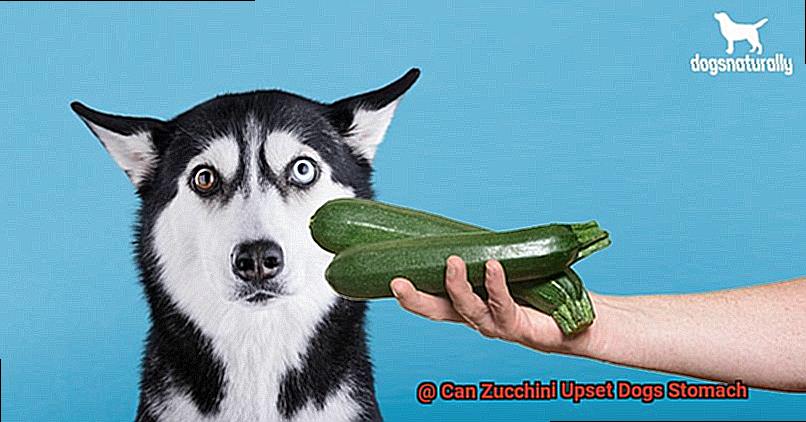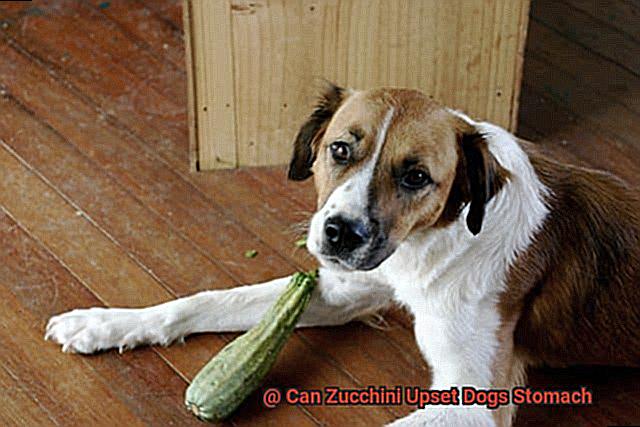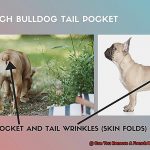Can Zucchini Upset Dogs Stomach?
Picture this: you’re in the kitchen, masterfully chopping up some zucchini for your next culinary masterpiece. But then you pause, looking over at your furry best friend with those pleading puppy eyes. Can dogs handle zucchini without their stomachs going haywire?
Well, my friend, buckle up because we’re about to take a wild ride into the world of zucchini and its impact on our pups’ sensitive tummies. Get ready to separate fact from fiction as we navigate the twists and turns of feeding zucchini to our four-legged companions.
In this blog post, we’ll leave no stone unturned as we unravel the mysteries surrounding zucchini’s effects on our canine pals. We’ll delve deep into the potential risks and rewards, ensuring your pup stays happy and healthy throughout their gastronomic adventures.
So grab a snack (zucchini optional) and get comfy because it’s time to uncover the truth about whether zucchini can be a friend or foe for your dog’s precious belly. Let’s dive in and find out if this green veggie is a superstar or a stomachache waiting to happen.
The Benefits of Feeding Zucchini to Dogs
Contents
- 1 The Benefits of Feeding Zucchini to Dogs
- 2 Potential Risks of Feeding Zucchini to Dogs
- 3 How to Introduce Zucchini to Your Dog’s Diet
- 4 Signs That Your Dog May Be Having Digestive Issues After Eating Zucchini
- 5 Preparing Zucchini for Dogs
- 6 Tips for Feeding Zucchini to Dogs Safely
- 7 Other Foods that Should Not be Fed Alongside Zucchini
- 8 When to Seek Veterinary Assistance for Your Dog’s Digestive Issues
- 9 Conclusion
If you’re a proud owner of a French bulldog, you know how important it is to provide them with a healthy and balanced diet. One vegetable that can be a great addition to your dog’s meals is zucchini. Not only is it delicious, but it also offers several benefits for your furry friend.
- Low in Calories and Fat: If your French bulldog needs to maintain a healthy weight or is on a weight loss program, zucchini is an excellent option. It is low in calories and fat, allowing your pup to indulge without worrying about packing on the pounds.
- Packed with Essential Nutrients: Zucchini is a powerhouse of essential vitamins and minerals that are beneficial for your dog’s overall health. It contains vitamin C, which supports a strong immune system, and vitamin A, which promotes healthy skin and coat. Additionally, zucchini is rich in potassium and manganese, which contribute to your dog’s well-being.
- Aids Digestion: The high fiber content in zucchini can aid in digestion and promote regular bowel movements in dogs. This can be especially helpful if your French bulldog tends to have digestive issues or experiences occasional constipation.
- Hydration Support: Zucchini has a high water content, making it an excellent choice for keeping your dog hydrated, especially during hot weather or if they are prone to urinary tract issues. Proper hydration is crucial for maintaining your dog’s overall health.
- Supports Joint Health: Antioxidants found in zucchini can help reduce inflammation and support joint health in dogs, particularly those with arthritis or other joint conditions. Adding zucchini to their diet can provide natural support for their joints and help them stay active and comfortable.
When feeding zucchini to your French bulldog, it is important to prepare it properly. Ensure that it is cooked thoroughly to aid digestion and eliminate any potential harmful bacteria or parasites. Remember to introduce zucchini slowly and in moderation, as excessive amounts can lead to an upset stomach or diarrhea due to its high fiber content.
Always monitor your dog’s response to any new food introduced into their diet. If you notice any adverse reactions, such as vomiting or abdominal discomfort, it’s best to consult with your veterinarian. They can provide guidance on the appropriate portion size and frequency of feeding zucchini to your furry friend.
Potential Risks of Feeding Zucchini to Dogs
Zucchini may be a nutritious and delicious vegetable, but it’s important to be aware of the potential risks when feeding it to your French bulldog. Here are some key points to consider:
- Gastrointestinal Upset: Dogs have sensitive stomachs, and sudden changes in their diet can lead to digestive issues. Feeding your dog too much zucchini or introducing it too quickly can result in gastrointestinal upset. Symptoms may include diarrhea, vomiting, and abdominal discomfort. To minimize the risk, start by offering small portions of zucchini and gradually increase the amount over time.
- Zucchini Seeds: While zucchini seeds are generally harmless in small quantities, ingesting large amounts can cause blockages in your dog’s digestive tract. It is crucial to remove the seeds before giving zucchini to your furry friend. This simple step can help prevent any potential complications.
- Allergies and Sensitivities: Just like humans, dogs can develop allergies or sensitivities to certain foods, including zucchini. If your dog experiences any unusual symptoms after consuming zucchini, such as itching, hives, or difficulty breathing, it is essential to seek veterinary advice. Your vet can help determine if your dog has an allergy or sensitivity to zucchini and recommend appropriate dietary adjustments.
- Toxic Parts of the Zucchini Plant: Although the flesh of zucchini is safe for dogs to eat, other parts of the plant, such as the leaves and stems, can contain toxins that are harmful to them. Ensure that you only feed your dog the flesh of the zucchini and avoid any other parts of the plant.

To summarize, while zucchini can be a healthy addition to your dog’s diet when prepared properly and given in moderation, it’s important to be aware of the potential risks. Monitor your French bulldog closely for any adverse reactions and consult with a veterinarian if you have any concerns or questions.
Remember, every dog is unique, and what works for one may not work for another. It’s always best to consult with a professional to ensure the health and well-being of your furry friend.
How to Introduce Zucchini to Your Dog’s Diet
French Bulldogs are beloved companions known for their adorable antics and unique personalities. As responsible pet parents, we always want to ensure our furry friends have a balanced and nutritious diet. Introducing new foods, like zucchini, can be a great way to provide variety and essential vitamins to your French Bulldog’s meals. However, it’s crucial to do it safely and gradually. In this article, we will explore the steps to safely introduce zucchini into your French Bulldog’s diet.
Step 1: Begin with Small Portions
Start by offering small amounts of cooked, plain zucchini as a treat or mix it with your dog’s regular food. This will allow your French Bulldog to get accustomed to the taste and texture of zucchini without overwhelming their digestive system.
Step 2: Monitor Your Dog’s Reaction
Observe your French Bulldog closely after introducing zucchini. Look out for any signs of digestive upset such as vomiting, diarrhea, or excessive gas. Every dog is unique, and some may have sensitivities or allergies to certain foods, including zucchini. If you notice any adverse reactions, discontinue feeding zucchini and consult your veterinarian.
Step 3: Gradually Increase the Amount
If your French Bulldog tolerates zucchini well, you can gradually increase the amount over time. However, remember that zucchini should only make up a small portion of their overall diet. A general guideline is to aim for around 10% of their daily food intake.
Step 4: Keep It Simple
Stick to plain, cooked zucchini without any added seasonings or oils. These can be harmful to dogs and may cause digestive issues. Steaming or boiling the zucchini until it becomes soft and easily mashable will aid digestion.

Step 5: Consult with Your Vet
Always consult with your veterinarian before making any significant changes to your French Bulldog’s diet. They can provide personalized advice based on your dog’s specific needs, health conditions, and dietary restrictions.
Signs That Your Dog May Be Having Digestive Issues After Eating Zucchini
We all know how much our adorable little French Bulldogs mean to us. And when it comes to their health, we want to be on top of everything, right? So, if you’ve recently added some zucchini to your Frenchie’s menu and noticed something a little off, don’t fret. We’re here to help you decode those signs of digestive issues. Let’s dive right in.
Diarrhea Dilemma:
If you’ve noticed your Frenchie having loose stools or making more trips to their private powder room after munching on zucchinis, it may be a sign that their delicate tummy is having trouble processing all that fiber goodness.
Vomiting Volcano:
Oh no. If your little Frenchie starts doing an impromptu food dance (aka vomiting) shortly after devouring zucchinis, it could suggest their stomach is feeling a bit upset and trying to say, “Hey, let’s get rid of this.”
Bloating Blues:
Picture this: your Frenchie lying around like a balloon ready to pop. If they seem restless, pacing, or even whining after eating zucchinis, it could indicate some abdominal discomfort or bloating happening inside.
Flatulence Fiasco:
Okay, let’s talk about the “p” in Frenchie – nope, not the paws but the poots. If your once dainty French Bulldog starts emitting more gas than a jet engine or their smells can clear a room faster than a vacuum cleaner, it might be a sign that their digestive system isn’t quite enjoying the zucchini party.
Appetite Amnesia:
You know your Frenchie’s foodie habits like the back of your hand. So, if they suddenly turn their nose up at their favorite dinner or show less excitement for mealtime after munching on zucchinis, it could be a result of some digestive discomfort.
Behavior Boo-Boos:
Our little Frenchies are known for their boundless energy, so if they’re suddenly acting like a couch potato or seem reluctant to move or play after eating zucchinis, it might be a red flag that their tummies are feeling a bit under the weather.
Preparing Zucchini for Dogs
You’ve heard that zucchini can be a healthy addition to your dog’s diet, and you’re excited to give it a try. But before you start slicing and dicing, let’s dive into the steps required to prepare zucchini for your furry friend. Whether you have a French Bulldog or any other breed, these tips will ensure that your dog enjoys this nutritious vegetable without any tummy troubles.
Step 1: Wash Away the Dirt and Pesticides
Just like with any fresh produce, it’s essential to clean the zucchini thoroughly. Dogs are sensitive creatures, and we want to make sure we remove any dirt or pesticides that may be lingering on the skin. Give the zucchini a good rinse under cool water to wash away any impurities. No one wants their pup munching on anything harmful.
Step 2: Peel Away the Tough Skin
Now, let’s talk about the skin. While we humans love the added texture and nutrients from the zucchini skin, it can be tough for our furry pals to digest. To make it easier on their delicate tummies, peel off the skin before feeding it to your dog. This way, they can enjoy the soft and tender flesh of the zucchini without any digestive woes.
Step 3: Cook or Serve Raw?
Next up, you have a choice to make – do you want to cook the zucchini or serve it raw? Both options are perfectly fine, but there are a few things to consider for each method.
If you choose to cook the zucchini, steaming or boiling is the way to go. These methods help soften the zucchini and make it easier for your dog to digest. Plus, some doggos prefer their veggies warm and cozy. Once cooked, remember to let it cool down before serving it to your pup. Safety first, folks.
On the other paw, if you decide to serve the zucchini raw, make sure to cut it into small, bite-sized pieces. This will help prevent any choking hazards and make it easier for your dog to chomp down on. Raw zucchini can be a refreshing and crunchy treat for those pups who love a good crunch.
Step 4: To Puree or Not to Puree?
Now, let’s talk about adding some extra pizzazz to your dog’s zucchini treat. Some pawrents prefer to puree the cooked or raw zucchini and mix it with their dog’s regular food. This not only adds some extra nutrients and flavor but also helps incorporate the zucchini into their meal seamlessly. It’s like a sneaky health boost that your pup won’t even notice.
Tips for Feeding Zucchini to Dogs Safely
Zucchini is a tasty vegetable that can be a healthy addition to your French Bulldog’s diet. However, it’s important to feed it to them safely and in moderation. In this article, we will explore some tips for safely feeding zucchini to your furry friend.
Wash and Clean Thoroughly:
Before giving zucchini to your French Bulldog, make sure to wash it thoroughly. This helps remove any dirt or pesticides that may be present on the skin. You can use water and a vegetable wash or simply scrub it with a brush.
Peel the Skin:
French Bulldogs have sensitive stomachs, so it’s best to peel the zucchini before feeding it to them. The skin can be tough and difficult for dogs to digest, so removing it can help prevent any digestive issues. Use a vegetable peeler or knife to carefully remove the skin.
Cook Before Serving:
Raw zucchini can be hard for dogs to digest and may cause stomach upset. It’s recommended to cook the zucchini before serving it to your French Bulldog. You can steam, boil, or bake it until it becomes soft and easily mashable. This makes it easier for your dog to chew and digest.
Cut into Bite-Sized Pieces:
To avoid any choking hazards, always cut the zucchini into small, bite-sized pieces before giving it to your French Bulldog. This reduces the risk of choking and makes it easier for them to eat.
Introduce Gradually:
If your French Bulldog has never had zucchini before, it’s important to introduce it gradually into their diet. Start with small amounts and monitor their reaction. If they show signs of stomach upset or digestive issues, discontinue feeding zucchini.
Other Foods that Should Not be Fed Alongside Zucchini
Are you looking to spice up your furry friend’s diet with some tasty zucchini? Well, before you start whipping up zucchini dishes for your four-legged companion, there are a few things you need to know. While zucchini is generally safe for dogs to eat, there are certain foods that should not be fed alongside it. As an experienced dog owner and zucchini enthusiast, I’m here to share my expertise and guide you through the do’s and don’ts of feeding zucchini to your French Bulldog.
- Onions and garlic: No tears in the kitchen, but definitely no onions or garlic in your zucchini dishes. These ingredients may add flavor to our human meals, but they can cause serious health issues for our furry friends. Onions and garlic are toxic to dogs and can lead to an upset stomach and even anemia. So, double-check your zucchini recipes and make sure they’re free of these harmful ingredients.
- Grapes and raisins: While grapes and raisins may make a sweet addition to salads or desserts, they’re a big no-no for dogs. These fruits can be toxic to our furry pals and cause kidney damage. So, avoid sharing any zucchini dishes that contain grapes or raisins with your French Bulldog.
- Chocolate: Now, I know chocolate is hard to resist – trust me, I’ve been there. But when it comes to sharing your zucchini creations with your pup, keep the chocolate out of the mix. Chocolate contains theobromine, which is toxic to dogs. Feeding zucchini dishes with chocolate can lead to symptoms like vomiting, diarrhea, rapid breathing, and even seizures. It’s better to be safe than sorry.
- Avocado: Ahh, avocados – the beloved superfood of the human world. While avocados are generally safe for dogs in small amounts, they can cause stomach upset if consumed in large quantities. So, if you’re planning on sharing your zucchini dishes with your furry friend, make sure they don’t contain any avocados.
- Dairy products: Who doesn’t love a cheesy zucchini casserole or a creamy zucchini soup? Well, your French Bulldog might not feel the same way. Some dogs are lactose intolerant, meaning they can’t properly digest lactose found in dairy products. Feeding zucchini dishes with cheese or milk to your pup can lead to unpleasant digestive issues like diarrhea or gas. So, save the dairy for yourself and keep it out of your dog’s bowl.
When to Seek Veterinary Assistance for Your Dog’s Digestive Issues
When to Seek Veterinary Assistance for Your French Bulldog’s Digestive Issues
French Bulldogs are adorable and lovable companions, but just like any other dog breed, they can experience digestive issues from time to time. While some digestive issues may resolve on their own with simple home remedies, it is important to know when to seek veterinary assistance to ensure your furry friend receives the appropriate care. Here are some signs that indicate it’s time to consult with your veterinarian:
- Prolonged vomiting or diarrhea: If your French Bulldog is experiencing persistent or severe symptoms such as prolonged vomiting or diarrhea, it is crucial to seek veterinary assistance. These symptoms can lead to dehydration and further complications if left untreated.
- Blood in the stool or vomit: The presence of blood in your dog’s stool or vomit is never a good sign and should prompt an immediate visit to the vet. It could be indicative of a more serious underlying condition that requires medical attention.
- Dehydration: If your French Bulldog is not drinking enough water or shows signs of dehydration such as dry gums, sunken eyes, or lethargy, it is important to seek veterinary care. Dehydration can worsen digestive issues and lead to other health problems.
- Abdominal pain: If your furry friend shows signs of abdominal pain such as restlessness, panting, or reluctance to move, it is essential to consult with your veterinarian. Abdominal pain can be a sign of a gastrointestinal blockage or inflammation that requires immediate attention.
- Loss of appetite: A sudden loss of appetite can be a sign of underlying digestive issues or other health problems. If your French Bulldog refuses to eat for more than 24 hours, it’s time to seek veterinary assistance.
In addition to these signs, if your dog ingests a foreign object or toxic substance, it is crucial to seek immediate veterinary assistance. Digestive issues can be caused by various factors such as dietary indiscretion, food allergies or intolerances, gastrointestinal infections, parasites, or underlying medical conditions. Your veterinarian will perform a thorough examination of your French Bulldog and may recommend diagnostic tests such as blood work, fecal analysis, or imaging studies to identify the underlying cause of the digestive issue.
Treatment options for digestive issues may include dietary changes, medications to alleviate symptoms such as nausea or diarrhea, antibiotics to treat infections, or surgery in severe cases. Remember, it is always better to err on the side of caution and seek veterinary assistance if you are unsure about the severity or cause of your French Bulldog’s digestive issues. Your veterinarian is the best resource to provide accurate diagnosis and appropriate treatment for your furry friend.
qXcn0bZXFTY” >
Conclusion
In conclusion, it is important to consider the potential effects of zucchini on your dog’s stomach.
While zucchini is generally safe for dogs to consume in moderation, excessive amounts or improper preparation can lead to digestive upset. It is crucial to introduce new foods slowly and observe your dog’s reaction.
Always consult with your veterinarian before making any significant changes to your dog’s diet.




